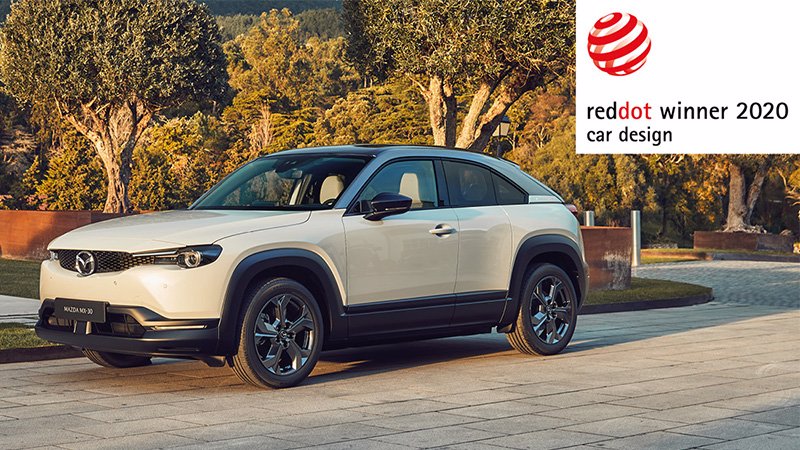New Mazda CX-30 and MX-30 win 2020 Red Dot design awards
Leverkusen, 31/03/2020

- Further evolutions of Kodo styling win double honors in annual product design contest
- Mazda CX-30 and MX-30 both win 'Red Dot: Product Design 2020'awards
- Eighth and ninth Red Dot awards won by Mazda's Kodo models to date
The new Mazda CX-30 and MX-30 have both been recognised in the 'Red Dot: Product Design 2020' awards. The CX-30 compact SUV and Mazda's first all-electric car, the MX-30, join the growing list of award-winning Mazda models designed under the Kodo: Soul of Motion philosophy.
The new Mazda CX-30 is the second production model created with the latest evolution of the Kodo design philosophy - artful design, rooted in traditional Japanese aesthetics. The honing of every element according to the 'less is more' principle has resulted in clean, beautiful surfaces on the CX-30 and brought an entirely original look to the compact crossover SUV segment.
"The Japanese master craftsmen have always prized simplicity of form, of being beautifully pure," says Jo Stenuit, Mazda's European Design Director. "This inspired our designers to trim back elements and create something dynamic yet elegant, restrained yet vital. This is how we perceive Japanese aesthetics - a sensibility that has created emotionally moving cars."
The Mazda CX-30's high quality, human-centric interior combines ergonomic excellence with state-of-the-art technology. The latest developments in Mazda's Skyactiv-Vehicle Architecture harness people's inherent balance ability for more natural and intuitive control of the vehicle. And the powertrain line-up features Skyactiv-X - Mazda's revolutionary petrol engine which delivers diesel-like efficiency[1].
Though retaining the beautiful, hand-crafted forms of Kodo design, the styling of the Mazda MX-30 represents an exploration of a more modern aesthetic which focuses on the futuristic values and lifestyles that are beginning to emerge.
"This new approach has resulted in an original design that embodies the expansion of Kodo's expressive range," explains Mazda MX-30 Chief Designer Youichi Matsuda. "The exterior is uncompromisingly simple to emphasise its beauty as a solid mass, and the cabin design - with its framed top and freestyle doors - embodies an image of lightness while proactively incorporating sustainability as an element for the interior materials.. As we begin an era of great change, we want the Mazda MX-30 to show people that our cars can still deliver pure joy of driving."
e-Skyactiv, Mazda's new electric drive technology, features a 35.5kWh lithium ion battery equipping the Mazda MX-30 with a range of approximately 200km, far exceeding the 48km average daily drive of European customers. Both the new EV's Skyactiv-Vehicle Architecture and its i-Activsense safety technologies have been tailored to perfectly compliment the vehicle's inherently smooth, quiet, all-electric driving behaviour.
These are the eighth and ninth Red Dot awards won by Mazda's Kodo models to date, following the all-new Mazda3 in 2019, the MX-5 RF in 2017, the MX-5 soft top, CX-3 and Mazda2 (all 2015), the previous generation Mazda3 (2014) and the Mazda6 (2013).
"The winners of the Red Dot Award have proved that they have created excellent products worthy of winning an award," says professor Dr. Peter Zec, founder and CEO of Red Dot. "The products won over the jury not only through their aesthetics, but also thanks to their incomparable functionality. With their designs, the award winners are setting new standards in their industry."
Initiated in 1955, Red Dot is one of the world's largest design competitions. The product design winners, selected this year in 48 categories including cars & motorcycles, have earned the right to use the Red Dot symbol, an international seal of excellence.
[1] MX-30 WLTP electric power consumption: 14,5-19,0 kWh/100km; Range: 200-262 (city); WLTP CO2 emissions: 0 g/km
NEDC electric power consumption: 16,0 kWh/100km (combined); Range: 237-298 (city); NEDC CO2 emissions: 0 g/km
[2] CX-30 Skyactiv-X WLTP fuel consumption: 5.9-7.0 l/100km; WLTP CO2 emissions: 133-160 g/km; NEDC fuel consumption: 4.6-5.6 l/100km; NEDC CO2 emissions: 105-128 g/km.
